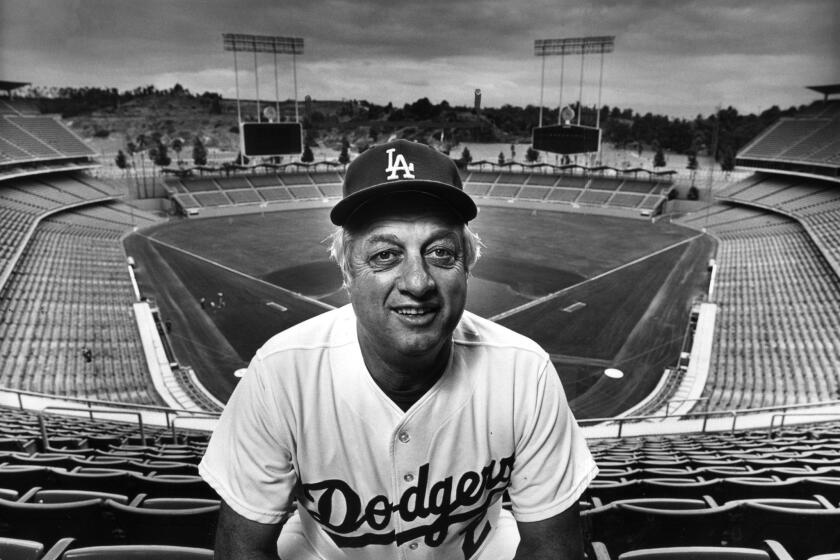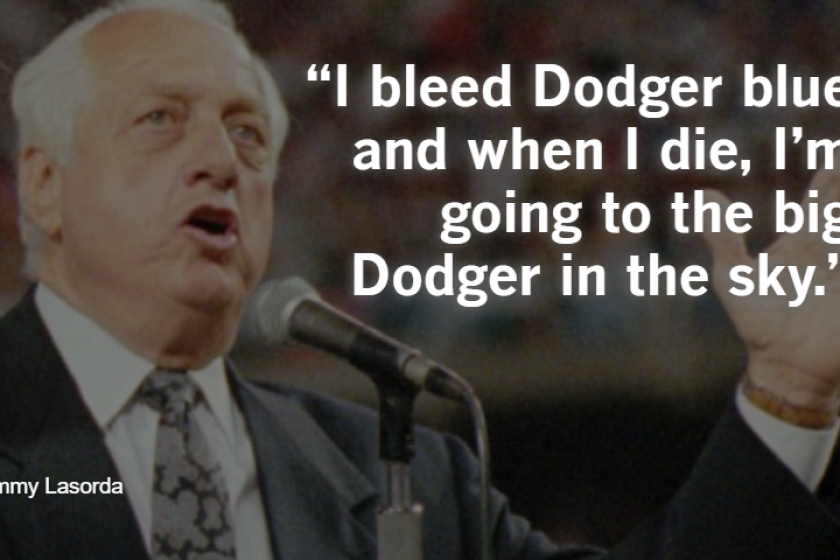Appreciation: Tommy Lasorda didnât die; his volume just has been turned down

Tommy Lasorda didnât die. They just turned down the volume. The world of sports will now be quieter, and much less fun.
âSo, Tommy, what is your opinion of Kingmanâs performance tonight?â
Lasorda was the Capital B in bombastic. He was about as soft-spoken as a bullhorn, as nuanced as a slap in the face. He was a walking volcano, Mount Vesuvius in Dodger Blue.
âI wouldnât make a pitcher throw at a [expletive] .130 hitter like [expletive] Bevaqua, who couldnât hit water if he fell out of a boat.â
What a kick Lasorda was. For those of us in the newspaper business, he was the ultimate baseball character, a laugh-a-minute quote machine. Dodger beat writers in the Lasorda managerial days should have paid for the privilege instead of getting salaries. He often yelled at sportswriters about their various ink-stained transgressions and then, at the end of the tirade, gave them a wink and a grin. He loved sportswriters almost as much as he loved yelling at them. He never underestimated their value.
He was the manager of the U.S. Olympic team in Sydney, in 2000. U.S. Olympic baseball was never any good because the Olympics were in the summer and the good players were in the big leagues. But Lasorda, retired from managing the Dodgers a few years earlier, was bored and looking for another challenge. So, he signed on to manage a collection of fuzzy-faced prospects and minor league castoffs. This amused me and one day, before the competition started, I went out to the ballpark, looking for Lasorda and some great quotes. Nobody was around. The U.S. team dugoutwas empty. The dugout was off limits to the press, but I wandered down the tunnel toward the clubhouse â even more off limits â while wondering where everybody was.
Then I heard the voice, the one with the cadence of f-bombs. I kept going and the voice got louder, now telling this collection of mostly baseball scrubs that they were one of the best teams he had ever managed, that there was so much talent in that room that they could compete in the big leagues, RIGHT NOW! Remember, he had managed two World Series championship teams.
âIâm gonna make a prediction here,â he bellowed. âTwo of you pitchers, maybe three, will win a Cy Young Award!â
I was intrigued, so I kept going and slipped into the back of the room, hoping not to be seen. But Lasorda saw me. He could spot a sportswriter at 1,000 yards, in a heavy fog. He paused, pondering whether to scream and kick me out or use the moment. He chose the latter, turning up the volume even more as he rallied the troops. He knew Iâd write about it. I did, with a tone that hinted at the absurdity of this pep talk. Two weeks later, the U.S. menâs Olympic baseball team, playing like they thought they were the 1927 Yankees, won the gold medal, under manager Tommy Lasorda.
Years later, I decided to write a column about Bruce Froemming, longtime National League umpire. We met hours before a Dodgers game in the seats right behind home plate at Dodger Stadium. I was about two questions into my interview when Lasorda, now a Dodger executive, wandered by. He did a double take, sized up the situation, and started yelling at Froemming about some long-ago game in which Froemming had tossed him. Froemming yelled back that he should have ejected him earlier and more often. And they were off.
By the time they had loudly relived their every argument, ejection and dirt kicked on home plate in their careers, 50 people or so had gathered. Lasorda yelled, Froemming yelled back. They were now performing. The insults were sprinkled with giggles and winks. I never asked another question. Didnât need to.
Around that same time, I went to South Bend, Ind., to cover a Notre Dame-Tennessee football game. There was a party the night before at the home of the Irish athletic director. I went and the first person I ran into was Lasorda. He said he was there to give a pregame pep talk the next day to the Notre Dame team. A few minutes later, he sauntered by and asked if I had a car. This was one of those events where you wander around and nibble at finger food. Lasorda didnât do finger food.
A look at the life of legendary Dodgers manager Tommy Lasorda, who died at the age of 93 on Thursday.
âLetâs go,â he said, and we were off to dinner in a city where 80,000 football fans were also eating dinner. I asked if he had a reservation and he said, âWe gotta pick up Digger on the way.â Thatâs Digger Phelps, Irish basketball coach with similar blarney skills to Lasordaâs.
We picked up Digger and drove to a restaurant named Parisiâs. The place was packed, of course. Again, I asked if Lasorda had reservations. âWe donât need reservations here,â he said. We were escorted to one of the best tables in the house, Lasorda sent his soup back twice because it wasnât hot enough, as he always did, and he and Digger proceeded to try to outdo each other with story after story. Soon, it was near midnight, the place was almost empty and I told Lasorda we ought to pay our bill and let the help go home.
âWe donât pay here,â Lasorda said.
I found the waiter on the way out and handed him a couple of $20 bills.
Before I dropped him off at his hotel, I asked Lasorda about his speech the next day to the Notre Dame team. âTheyâll win,â he said. âWhen I make a pregame speech, the team always wins.â
The next day, Tennessee beat Notre Dame. That Monday, I called Lasorda and asked how the Irish could have lost after his speech.
âThey were ahead at halftime,â he said, âbut then I had to leave to catch a plane.â
Legendary Dodgers manager and baseball ambassador Tom Lasorda died of a heart attack Thursday at age 93. He was always quick with a quip, and here are some.
One day, I was sitting in the Dodgers press box with a friend, Father Billy McKinney. He had worked for me in the sports department of the Milwaukee Journal years earlier and then gone into the priesthood. He was one of two Journal sportswriters who went into the priesthood, perhaps a reflection of my management skills. Lasorda wandered by. I introduced them. McKinney, who had become the top priest on an Indian reservation in South Dakota, told him he was in town to meet some potential donors.
âHell with that,â Lasorda bellowed. âHow much money do you need? Dwyre and I will raise it. Weâll come out there, make a speech, sell some tickets, raise the money. Just say when. Dwyre will arrange it.â
Oh, goody. A trip to South Dakota.
Six months later, McKinney died of a heart attack, but Lasorda demanded we still go. We flew into Rapid City, a priest and two nuns picked us up, and drove us for several hours to a convent, converted to both priest and nun housing. Lasorda called his wife, Jo, to tell her he was sleeping in a convent, then settled in with half a dozen priests around a table to be Tommy Lasorda. I excused myself and headed to bed. The last Lasorda words I heard were, âSo, I was telling Ronnie, Ronnie Reagan, your damn military needs more money and âŚâ
The next day, we would work our way back to Rapid City, stopping at a couple of reservation schools, where hundreds of kids would swarm Lasorda and he would tell them Dodger Blue stories. He stayed for hours. He was a rock star.

Late in the afternoon, the priest and the same two nuns drove us back to Rapid City, where Lasorda was to speak at the city auditorium. I picked up the local newspaper at our hotel and a huge headline on the front page announced Lasordaâs speech. Later, the priest and the same two nuns picked us up and took us to the auditorium, where Lasorda pictures hung from the walls. He made his speech, telling Dodger Blue stories I had heard dozens of times but were spellbinding to the audience in the packed auditorium. He raised thousands of dollars for the reservation.
Lasorda suggested a nightcap, but I begged off and headed out on the short walk back to the hotel. I looked back down the street as Lasorda and the two nuns walked toward an area with several establishments that looked like bars and strip joints. The next morning, the priest and two nuns picked us up and drove us to the airport. In those days, people could walk you all the way to the departure gate, and they did. There were warm goodbyes.
When we got seated on the plane, I asked Lasorda to assure me he hadnât taken those nuns to one of those places last night.
âDammit,â he snarled, in a non-denial denial. âEverybody needs to have fun once in a while.â
So, it seems fair to conclude here. Despite his potty mouth, Tommy Lasorda is likely in heaven now â the big place, not just the Dodger Blue satellite â in part because a couple of nuns prayed him there.
More to Read
Are you a true-blue fan?
Get our Dodgers Dugout newsletter for insights, news and much more.
You may occasionally receive promotional content from the Los Angeles Times.











